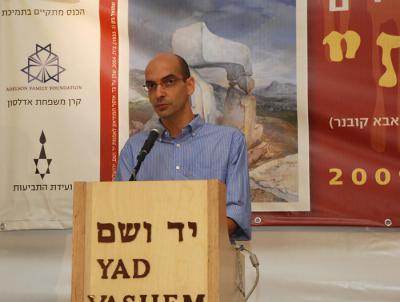This interview was originally published in our e-newsletter of January, 2006, when Dr. Avraham was Director of the ICHEIC program in the International School for Holocaust Studies at Yad Vashem. His overview of the program remains inspiring for his colleagues in the European Department and around the world, who continue to meet and exceed the expectations presented here.
Rationale and Expertise
Dr. Avraham, what is the ICHEIC Program at Yad Vashem and what was the rationale behind its establishment?
The ICHEIC Program is a special project initiated and funded by ICHEIC, the International Committee for Holocaust Era Insurance Claims Humanitarian Fund, which is scheduled to continue for the next 9 years. We established the Program in March, 2005 to encourage Holocaust education throughout Europe, to combat antisemitism, racism, and xenophobia, and to foster human rights awareness through Holocaust education.
Why was the International School for Holocaust Studies at Yad Vashem chosen to conduct this program?
I would say that the expertise and experience of staff at the International School was the basis for the decision. Since 1993 our professional staff at the International School has been working closely with educators both from Israel and throughout the world and have garnered a large amount of experience and expertise in the field of Holocaust education. In addition, we have created a first class team of educators and historians, and developed a wide range of educational curricula. The International School was among the first to develop interdisciplinary educational approaches to Holocaust studies and its applications, such as through cinema, art, theatre, and literature.
Activities and Achievements
You explained the educational activities of the school. In what way are the activities of the ICHEIC Program unique?
Whereas in the past we conducted seminars specifically for the purpose of training teachers to educate their students about the Holocaust, we now aim to create a network of European teachers who will serve as multiplicators of Holocaust education. By becoming multiplicators, the teachers will go on to disseminate the knowledge and pedagogical tools required for teaching the Holocaust in their own communities. Through this network, teachers from all over Europe will also be able to take part in an exchange of ideas and share practical approaches. We then intend to create specific tools such as forums, a newsletter, and international seminars to encourage teachers to share their experiences, problems and working methods.
What has been achieved in the first year of the Program?
Thanks to the ICHEIC Program, in the last year the International School for Holocaust Studies has seen its educational activities double. In 2005 we coordinated an unprecedented 19 seminars for an approximately 350 European educators. In November alone we held seminars at Yad Vashem for educators from 6 different countries – including for the first time from the Czech Republic – and a similar number of seminars in Europe. We have also created a wide range of educational materials in more than 6 languages, and many of these resources are available on our website.
We are now encouraging local initiatives by graduates of our seminars, such as local conferences, the creation of teaching units, curricula, etc, and since the establishment of the Program we have witnessed a marked increase in these initiatives.
I would go as far as to say that the ICHEIC Program has been the catalyst for expanding our use of the Yad Vashem website as an educational tool. Today projects created by our graduates and their students can be accessed through our website. We are in the final stages of production of our first ever e-learning course on the Holocaust in Hungarian, and it will later be adapted into a number of other languages. As mentioned, we are also in the process of creating an online forum that will provide our graduates with a virtual meeting place to exchange ideas and experiences.
In February, 2006 we will hold the first-ever ICHEIC International Forum with educational experts from all over Europe. Participants will examine a wide range of topics pertaining to Holocaust education, including the importance of seminars both in Israel and in Europe as well as the production of specific educational units for use in a variety of European countries. An important aspect of the Forum will be our work towards the creation of an active network of educators who will contribute to the promotion of Holocaust education in Europe.
What has been the reaction of Holocaust educators taking part in International School seminars?
We have received very positive feedback from most of our seminar graduates who leave Yad Vashem feeling highly motivated, expressing their interest to transmit what they have learned to those within their local communities.
Thank you for your time. We look forward to hearing about the progress of the Program in future editions of the newsletter.







